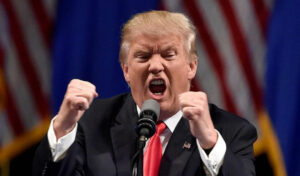By Kyle Aristophere T. Atienza, Reporter
THE PHILIPPINES on Wednesday called its alliance with the US “unshakeable” in the face of Asian trade terms being reset if Republican candidate Donald J. Trump, who claimed victory in the presidential race, keeps his campaign promise to increase tariffs.
Philippine President Ferdinand R. Marcos, Jr. congratulated Mr. Trump, saying his robust leadership would result in a better future.
“President Trump has won, and the American people triumphed, and I congratulate them for their victory in an exercise which showed the world the strength of American values,” he said in a statement.
“I am hopeful that this unshakeable alliance, tested in war and peace, will be a force of good that will blaze a path of prosperity and amity, in the region, and in both sides of the Pacific,” he added.
Millions of Americans voted as early as Tuesday in what is considered to be one of the most important presidential elections in decades.
Mr. Trump and Democrat Kamala Harris were almost tied in opinion polls, but results as of Wednesday afternoon showed him leading in key battlegrounds. This complicates Ms. Harris’s path to the 270 electoral votes.
Mr. Trump has pushed protectionist policies and pledged to turn the US into a manufacturing superpower. He is seeking 60% or higher tariffs on all Chinese goods and a 10% universal tariff.
Mr. Marcos said he looks forward to working with Mr. Trump on a wide range of issues that “will yield mutual benefits to two nations with deep ties, shared beliefs, common vision and a long history of working together.”
“This is a durable partnership the Philippines is fully committed to because it is founded on the ideals we share — freedom and democracy.”
Earlier in the day, US Ambassador to the Philippines MaryKay Carlson said there’s strong support for foreign military financing to the Philippines from both Democrats and Republicans.
‘STEADFAST FRIENDS’
While there are nuances that will change in every US government, “the strength of the US-Philippine relations and the importance of the Indo-Pacific to the American people will remain,” she said on the sidelines of an election-viewing event in Manila.
“I am extremely confident that US-Philippine relations will remain steadfast friends and ironclad allies as well as partners in prosperity no matter who wins in the elections of the US today.”
Ms. Carlson said looking at the foreign military financing and the support for the US-Philippine military relationship, “it is as many Republicans as Democrats who are enthusiastically supporting the US-Philippine alliance.”
“It’s the Congress that holds the purse strings in terms of financing all of our operations overseas, whether it is civilian or military,” she added.
The US under President Joseph R. Biden has reiterated that its 1950s Mutual Defense Treaty with the Philippines covers armed attacks on Philippine vessels, personnel and other assets anywhere in the South China Sea.
It was Mr. Trump, who is leading the presidential race, who promoted the concept of a “free and open Indo-Pacific,” mentioning it during the Asia-Pacific Economic Forum in the Philippines in 2017.
Mr. Biden has widely supported the concept, launching an Indo-Pacific Economic Framework (IPEF) in 2022 with a dozen initial partners. Manila joined the informal economic bloc in the same year and signed a supply-chain agreement along with other members in 2023.
The US has cited its “ironclad commitment” to the Philippines amid China’s intrusions into Manila’s exclusive economic zone in the South China Sea, which has become one of the major geopolitical hotspots in recent years.
The US was the largest market for Philippine exports and the fourth-largest source of imports last year.
Ms. Carlson said bipartisan support for the Philippines goes “across the board, not just when it comes to our military-to-military relationship.” “We are very strong partners in prosperity,” she said, citing the various bilateral and multilateral economic partnerships established in the past years.
Philippine Ambassador to the US Jose Manuel “Babe” D. Romualdez noted that amid “a lot of speculations” on what the US elections would mean for the Philippines, “I confidently say that the US-Philippine partnership will endure under any US president.”
“We will continue to strengthen and enhance not only our bilateral defense cooperation, but our economic ties as well, cognizant that the economically secure and prosperous Philippines will be an even better ally and partner for the United States,” he said.
Mr. Trump’s recent policy remarks, including his famous America First policy and an emphasis on burden sharing, have stoked concerns that Washington could adopt an inward-looking and isolationist approach.
During his presidency, Mr. Trump withdrew from various global institutions including the Paris Climate Agreement and the Trans-Pacific Partnership.
Amid uncertainties, the Philippines has been urged to cement ties with the likes of Japan and Australia, which have been active in supporting Manila on the economic and security fronts.
Australian Ambassador Hae Kyong Yu in a speech at the same forum reiterated Australia’s commitment to Southeast Asian nations including the Philippines, citing its long-term economic plan for the region.
Australia’s Foreign minister in March said Australia would invest $2.5 billion over the next four years, including $1.55 billion in new funding to enhance Australia’s Southeast Asia maritime partnerships.
Ms. Yu said the funding would complement the next phase of Australia’s bilateral civil maritime investment in the Philippines, which “will double in size to $256 million.”
“In addition, Australia has been proud to join vessels from the Philippines and other states to participate in various maritime cooperative activities in the Philippines,” she added.

